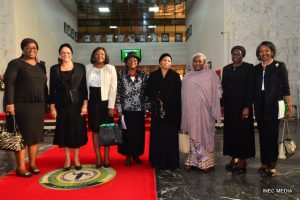Chairman of the Independent National Electoral Commission (INEC), Prof. Mahmood Yakubu has called on the Chief Justice of Nigeria (CJN), Justice Walter Onnoghen to address the spate of conflicting judgments on electoral cases in the country.
He said the Commission was worried about the recurring decimal among courts of coordinate jurisdiction on the same subject-matter, especially in cases related to pre-election, post election and leadership crises in political parties. Apart from its enormous cost implications to the country, the INEC Chairman said the practice had also created a negative public perception.
Prof Yakubu spoke on 17th January, when he led members of the Commission on a courtesy visit to the CJN in Abuja. According to him, with the 2019 General Elections barely a year away and for which the Timetable and Schedule of Activities had already been announced, it had become imperative to draw the CJN’s attention to the Commission’s areas of concern.
He said: “For instance, in a recent leadership crisis in one political party, the Commission was served with six conflicting judgments and orders from courts of coordinate jurisdiction within a short period of three months (May – July 2016). Similarly, the Commission was confronted by conflicting pronouncements by the lower courts on matters already decided by the superior courts, including the Supreme Court. This is making the work of the Commission very difficult and creating unnecessary negative public perception for INEC and, I must say, the Judiciary as well.”
He continued: “My Lords, in the course of discharging our responsibilities, no public institution in Nigeria is subjected to more litigations than INEC. Over the last two years (2016 and 2017), the Commission has been involved in 454 court cases, in addition to 680 cases determined by the Election Petition Tribunals, arising from the outcomes of the 2015 General Elections, making a total of 1,134 cases so far.”

He expressed satisfaction with what he described as a “productive working relationship” between and the Judiciary and INEC, recalling that in 2011 when the Commission was inundated with numerous and sometimes conflicting ex parte orders from courts of coordinate jurisdiction, it was the CJN’s intervention following an appeal from the Commission, that averted a major threat to the electoral process. That intervention, he affirmed, stemmed the frequent use of such orders in election litigation in Nigeria.
His words: “It is in the spirit of this longstanding engagement with the Judiciary that the Commission once again seeks the intervention of Your Lordship in addressing the issue of conflicting judgments and other issues we consider pertinent in election litigation in Nigeria. We hope that by addressing these issues, the Judiciary would further assist the Commission and, indeed, the country in growing our democracy.”
Prof Yakubu explained that as a demonstration of its commitment to the rule of law, the Commission obeyed all court orders and carried out all consequential actions since the 2015 General Elections. He said INEC also conducted all the 80 court-ordered re-run elections and had issued Certificates of Return to 23 petitioners declared winners by the Appeal Tribunals.
He said: “We have similarly obeyed all court orders on the registration of political parties, leadership disputes in political parties, nomination of candidates and a host of other judgments, “ He assured the CJN that the Commission “shall continue to obey court orders, while taking full cognizance of judicial hierarchy at all times.”
He reiterated the responsibility shared by the Judiciary and INEC for ensuring certainty and credibility of both the process and outcome of elections “and the peace and progress of our country as a stable democracy based on the will of the people and anchored on the rule of law.”
He commended the leadership of the Judiciary for standing firmly on the side of justice in several landmark judgments. But the challenge, he observed, is how to ensure constituent application of such decisiveness by courts at all levels.
Responding, Justice Onnoghen agreed that both the Judiciary and INEC were the foundation of democracy in Nigeria. He said conflicting court orders were bound to arise as a result of the multiple court cases filed by politicians at different courts, which according to him, were bound to have different facts and different interpretations by the different presiding judges.
He said: “the beauty of the system is that it has a way of correcting itself. That is why you have the appellate system to take care of errors and mistakes committed in the course of court proceedings and in respect of substantive law”.
The CJN said the Judiciary was aware of the enormous responsibility before it assuring that it would remain committed towards deepening democracy and improving the system. He however urged the Commission to educate Nigerians on their roles as well as INEC’s.
Prof Yakubu presented the Commission’s compilation of some of the issues critical to election litigation in Nigeria and its recommendations to the CJN.
The Commission’s team include National Commissioners Adekunle Ogunmola, Solomon Soyebi, Baba Shettima Arfo, Amina Zakari, Anthonia Okoosi-Simbine, May Agbamuche-Mbu, Okechikwu Ibeanu and Mohammed Haruna.
Others are the Chief Technical Adviser to the Chairman, Prof Bolade Eyinla, Special Adviser to the Chairman, Prof. Mohammed Kuna, Secretary to the Commission, Mrs. Chinwe Ogakwu and some Directors.
